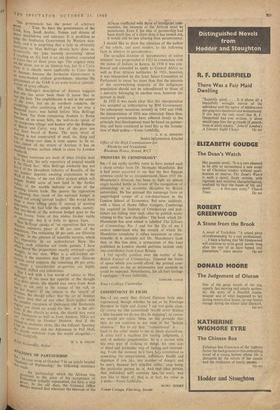SIR,._.. "'MY OF PARTNERSHIP
Awe' In Your issue of October 7 in an article headed was `°")Y of Partnership,' the following reference s ade: ' • • the 'partnership' which the African was Pyreodini.sed as the price of his acceptance of Federation actually represented, for him, a step In the old days, the Colonial Office always insisted that wherever the interests of the
African conflicted with those of immigrant com- munities, the interests of the African must be paramount. Even if the idea of partnership had been much less of a sham than it has turned out, it would still be less alluring than paramountcy.
I should like to draw the attention of the author of the article, and your readers, to the following facts in relation to paraniountcy
The so-called doctrine of 'paramountcy of native interests' was propounded. in 1923 in connection with the status of Indians in Kenya. In 1930 it was con- firmed and extended to apply to Central Africa as well as East African territories. In 1931, however, it was interpreted by the Joint Select Committee of Parliament to mean `no more than that the interests of the overwhelming majority of the indigenous population should not be subordinated to those of a minority belonging to another race, however im- portant in itself. . .
In 1932 it was made clear that this interpretation was accepted as authoritative by HM Government. On subsequent occasions,' notably in 1945 and 1948, the interpretation of 1931. was reiterated. Since then. successive governments have adhered firmly to the principle that development must be based on partner- ship and have continued to treat this as the founda- tion of their policy.—Yours faithfully, L. F. G. ANTHONY Senior. Information Attache Office of the High Commissioner for Rhodesia and Nyasaland, Rhodesia House, Strand, WC2


















































 Previous page
Previous page